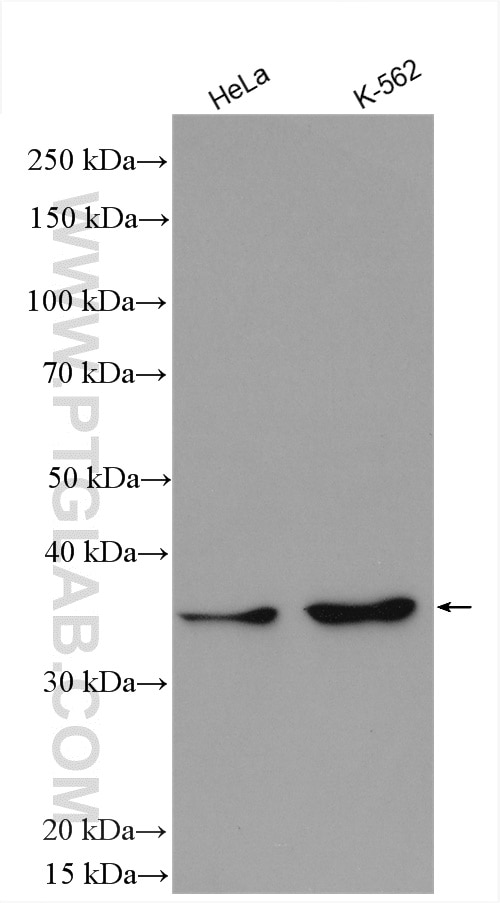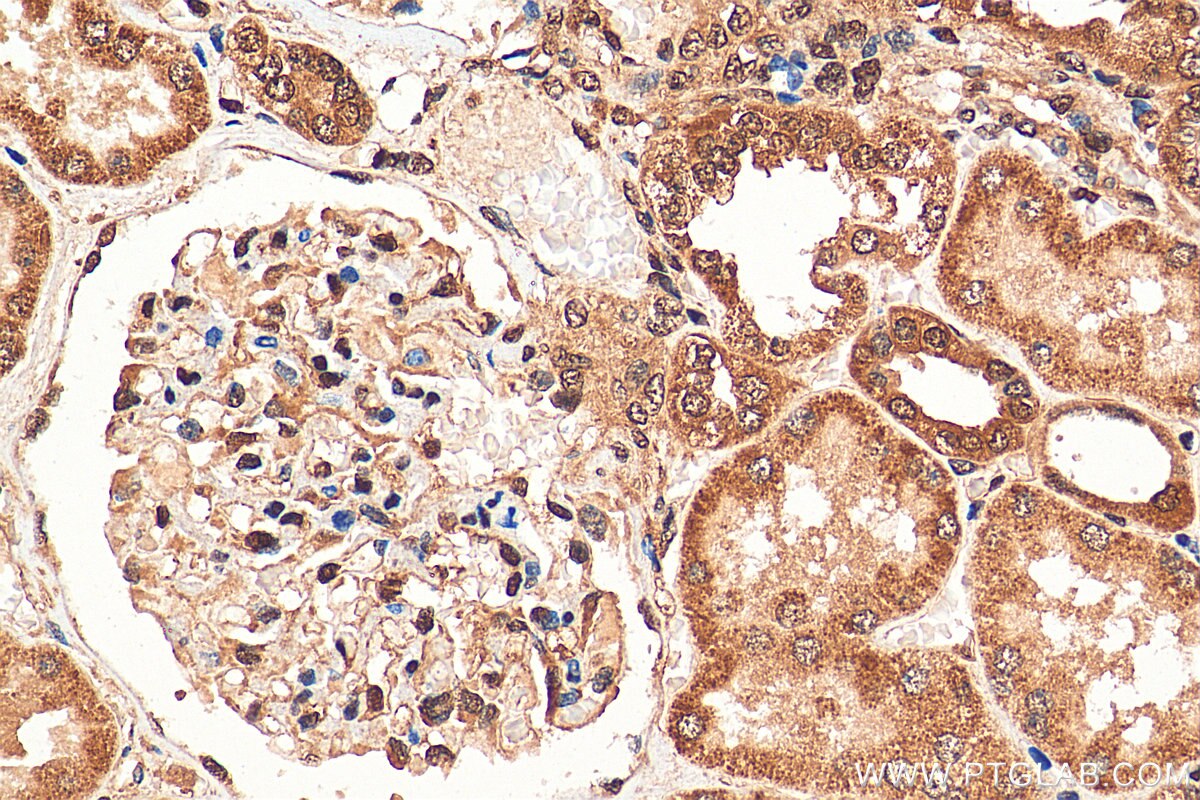WDR5 Polyklonaler Antikörper
WDR5 Polyklonal Antikörper für IHC, WB, ELISA
Wirt / Isotyp
Kaninchen / IgG
Getestete Reaktivität
human, Maus, Ratte
Anwendung
WB, IHC, IF, ChIP, ELISA
Konjugation
Unkonjugiert
Kat-Nr. : 15544-1-AP
Synonyme
Galerie der Validierungsdaten
Geprüfte Anwendungen
| Erfolgreiche Detektion in WB | HeLa-Zellen, K-562-Zellen |
| Erfolgreiche Detektion in IHC | humanes Nierengewebe Hinweis: Antigendemaskierung mit TE-Puffer pH 9,0 empfohlen. (*) Wahlweise kann die Antigendemaskierung auch mit Citratpuffer pH 6,0 erfolgen. |
Empfohlene Verdünnung
| Anwendung | Verdünnung |
|---|---|
| Western Blot (WB) | WB : 1:1000-1:4000 |
| Immunhistochemie (IHC) | IHC : 1:50-1:500 |
| It is recommended that this reagent should be titrated in each testing system to obtain optimal results. | |
| Sample-dependent, check data in validation data gallery | |
Veröffentlichte Anwendungen
| WB | See 3 publications below |
| IF | See 1 publications below |
| ChIP | See 1 publications below |
Produktinformation
15544-1-AP bindet in WB, IHC, IF, ChIP, ELISA WDR5 und zeigt Reaktivität mit human, Maus, Ratten
| Getestete Reaktivität | human, Maus, Ratte |
| In Publikationen genannte Reaktivität | human |
| Wirt / Isotyp | Kaninchen / IgG |
| Klonalität | Polyklonal |
| Typ | Antikörper |
| Immunogen | WDR5 fusion protein Ag7900 |
| Vollständiger Name | WD repeat domain 5 |
| Berechnetes Molekulargewicht | 37 kDa |
| Beobachtetes Molekulargewicht | 36 kDa |
| GenBank-Zugangsnummer | BC001635 |
| Gene symbol | WDR5 |
| Gene ID (NCBI) | 11091 |
| Konjugation | Unkonjugiert |
| Form | Liquid |
| Reinigungsmethode | Antigen-Affinitätsreinigung |
| Lagerungspuffer | PBS mit 0.02% Natriumazid und 50% Glycerin pH 7.3. |
| Lagerungsbedingungen | Bei -20°C lagern. Nach dem Versand ein Jahr lang stabil Aliquotieren ist bei -20oC Lagerung nicht notwendig. 20ul Größen enthalten 0,1% BSA. |
Hintergrundinformationen
The WDR5 antibody targets the WD repeat protein domain 5 (WDR5), a member of the WD40 repeat protein family in humans. The WDR5 protein is a core member of the mammalian trithorax complex and, like the rest of the WD40 repeat protein family, is primarily involved in diverse cellular processes. WDR5 is identified as a methyl Lys-4 H3-specific-binding protein, however it is known to interact with the Mixed Lineage Leukemia (MLL) protein at the same site for histone H3 tri-methylation(PMID:18840606). Recently, the WDR5 protein has been shown to regulate embryonic stem cell self-renewal, and an increased expression of WDR5 has been found to efficiently induce the formation of pluripotent stem cells (PMID:21477851). WDR5 is also shown to accelerate osteoblast and chondrocyte differentiation(PMID:16730692 ).
Protokolle
| Produktspezifische Protokolle | |
|---|---|
| WB protocol for WDR5 antibody 15544-1-AP | Protokoll herunterladen |
| IHC protocol for WDR5 antibody 15544-1-AP | Protokoll herunterladen |
| Standard-Protokolle | |
|---|---|
| Klicken Sie hier, um unsere Standardprotokolle anzuzeigen |
Publikationen
| Species | Application | Title |
|---|---|---|
Nat Commun KMT2A associates with PHF5A-PHF14-HMG20A-RAI1 subcomplex in pancreatic cancer stem cells and epigenetically regulates their characteristics | ||
Sci Adv A MYC inhibitor selectively alters the MYC and MAX cistromes and modulates the epigenomic landscape to regulate target gene expression. | ||
Proc Natl Acad Sci U S A Compensatory functions of histone deacetylase 1 (HDAC1) and HDAC2 regulate transcription and apoptosis during mouse oocyte development. | ||
Pharmacol Res HPV E7-drived ALKBH5 promotes cervical cancer progression by modulating m6A modification of PAK5 |



